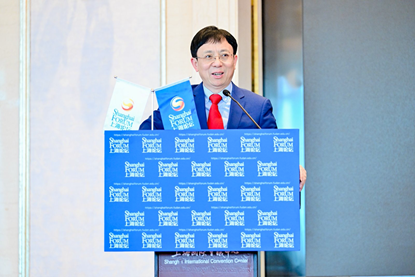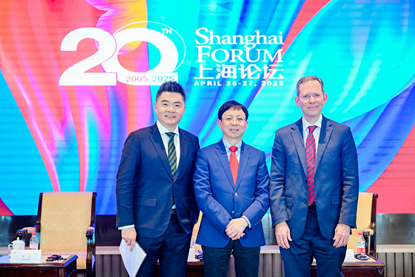On the afternoon of April 25 2025, at Shanghai Forum 2025 held at the Shanghai International Convention Center, Professor Wu Xinbo, Dean of the Institute of International Studies and Director of the Center for American Studies at Fudan University, engaged in a high-level dialogue with Rick Waters, former Deputy Assistant Secretary of State, the U.S., and Director of Carnegie China. Titled “China-U.S. Relations: The General Trend and Short Cycles,” the dialogue was moderated by Yin Fan, anchor at Yicai Media Group, and attracted nearly 300 global elites in academia, business, and media. Pearl Hall, overlooking the Huangpu River, was filled to capacity, with lively exchanges between the speakers and the audience.

In his keynote speech, Professor Wu emphasized the shifting focus of Donald Trump’s second presidential term. While security issues were prioritized during Trump’s first term, his second term places greater emphasis on economic and trade matters. Wu argued that Trump’s high-pressure, “all-in” approach to the trade war has created intense confrontation and deadlock in China-U.S. relations, with spillover effects across diplomacy, security, politics, and people-to-people exchanges. He pointed out that the Trump administration had misjudged China’s position, wrongly assuming China would concede, whereas China had prepared thoroughly and responded effectively. Wu concluded that while the U.S. holds the initiative in escalating the conflict, China holds the initiative in negotiation.

Rick Waters offered a macro-level structural analysis of the key factors shaping China-U.S. relations. He identified three main forces: China’s continued rise and expanding influence at both regional and global levels; the sharp differences between the two countries’ economic development models; and mounting societal-level frictions, such as issues related to fentanyl and policy transparency. Waters emphasized that these challenges are long-term and systemic—not the result of any one U.S. administration—and that stabilizing the relationship will require gradually recalibrating the pace and tone of bilateral interactions, which ultimately serves the interests of the broader international community.

During the dialogue session, Wu argued that the Trump administration views “defeating” China as essential to restoring American strength. Waters responded that the U.S. is not necessarily seeking full “decoupling,” but rather more targeted, issue-specific solutions.
On the Taiwan question, Wu warned that Trump’s use of the “Taiwan card” could risk crossing red lines and generating significant dangers. Waters, however, emphasized that successive U.S. presidents have historically focused on risk management regarding Taiwan, seeking to prevent conflict rather than escalate tensions, thus preserving space for future dialogue.

Looking ahead, Waters suggested that the two countries could strengthen cooperation on practical issues such as counter-narcotics efforts. Wu, meanwhile, underscored the importance of deepening cooperation in economic and trade sectors, stressing the need for a comprehensive, interconnected approach that recognizes the links between trade, investment, technology, and finance.
In the lively Q&A that followed, audience members posed questions on a wide range of topics, including shifts in China policy between the Biden and Trump administrations, the impact of U.S. domestic politics on bilateral relations, the role of American allies, and technological competition between China and the U.S.




